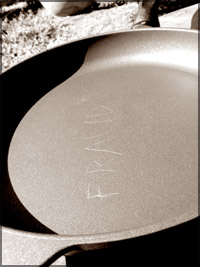Non-stick sneezes
 A
chemical found in Teflon and other non-stick coatings could raise the
risk of allergies, researchers said. The scientists claim the product
may prime(prepare) the immune system to overreact to allergy triggers,
or allergens, such as dust mites or animal hair. A
chemical found in Teflon and other non-stick coatings could raise the
risk of allergies, researchers said. The scientists claim the product
may prime(prepare) the immune system to overreact to allergy triggers,
or allergens, such as dust mites or animal hair.
Lab mice given the chemical perfluoro-octanoic acid before being
exposed to an allergen suffered more trouble breathing than those
exposed to the allergen alone.
The results suggest a possible explanation for the rising incidence
of childhood asthma.
The acid is also used to make all-weather clothing and
stain-resistant fabrics and carpets.
The researchers at the National Institute for Occupational Safety and
Health in West Virginia,USA examined the immune responses of mice subjected to an allergen. They found that those
exposed to the acid first were more likely to have a reaction.
immune responses of mice subjected to an allergen. They found that those
exposed to the acid first were more likely to have a reaction.
The doses of the chemical given to the mice were considerably higher,
however, than the levels humans are likely to be exposed to.
Perfluoro-octanoic acid has become so widespread over the years that
almost everyone has it in their body, including newborns. Although the
concentrations in human blood are relatively low, there are fears about
the potential health effects. The acid can contribute to thyroid
problems, immune changes and testicular, liver and pancreatic cancer in
laboratory animals.
Dr. Robert Rickard of the U.S. chemicals firm which makes Teflon said
perfluoro-octanoic acid was unlikely to cause allergy-related problems
in humans.
He admitted however that no studies had previously looked at the
issue. The company has found very small amounts of the chemical in
treated carpets and upholstery.
Heat-resistant Teflon was discovered by accident by chemist Roy
Plunkett in 1938. In 1960 the U. S. Food and Drug Administration
approved it for use in cookware. When it is heated to exceptionally high
temperatures, the coating can break down and release perfluoro-octanoic
acids.
In 2004, the company agreed to an out-of-court settlement in a
lawsuit brought by about 50,000 residents who lived near its West
Virginia plant. They claimed the company had contaminated (affected)
their water supplies with the acid.
They alleged the chemical was linked to birth defects and other
linked health hazards. The company did not accept liability and has
maintained that perfluoro-octanoic acid does not pose a danger to the
public.
An estimated one in eight children suffers from asthma while one in
five is diagnosed with the condition at some stage in their lives.
Significant risk factors include obesity, genetic inheritance,
smoking, low birth weight, air pollution and allergens such as exhaust
particles, smoke and household dust mites.
Daily Mail
|
